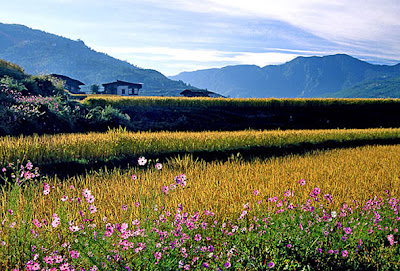We busied ourselves no sooner did we reach the picnic spot. Some set off to fetch firewood, a few ferried water and others involved in cooking. It’s, more importantly, a union among siblings and among friends. After long time back though. As we held individual responsibility, we set about chatting. We talked about our works, relationship with our colleagues and bosses. We talked about untreated inflation on grocery, vegetables and car fuels. We talked about Rupee crisis, economy crisis in Bhutan. And so on. We’re so fully engrossed, both with works in front of us and with our incessant talk.
But
my niece, just 7-year old, stood ecstatically excited all day. Her exposure to
open nature-may be her first time-left her mesmerized. Unlike us, she wandered
around, noticing things everywhere. And she was overcome by constant wonder. She
watched on the colorful wild flowers, fishes in the river and flying birds. She
wondered at how a wild flower can be in full bloom (after the harsh winter) in
the midst of thorns. She wondered at how a fish swims so swiftly and can live
under water. She wondered at how long those traditional houses in ruins been
there, who had lived there. She asked me all this though, ah.
My
niece wondered about those wholly ordinary she saw around. But as adults,
we’re lulled in the triviality of everyday existence. We succumb to the
details. We hurry every time. We run after time. We run after appointments. We
run after deadlines. We run after money. We run after people. We run after
conflicts and controversies. Above all, we let ourselves be lulled into “busy”
humdrum of our lives. And alas, we wrap our minds and forget to wonder. We
forget to stop and wonder about those magical moments in front of us. And each
time, we miss moments of wonder.
It was late afternoon when we set out from Paro. Back to home in Thimphu. Inside car, my siblings kept talking
about everyday stuffs. I sat by window side. As car ranted on, air gushed
forth, so cool, fresh. Valleys, houses and trees perched sumptuously across the
terrains. Gorgeous rays of sunset kept dancing, flickering inside car.
I
looked up, up above at the dome of the glorious sky. So large. And eventually I
saw the setting sun glancing from behind the mountains, shining bright. A little
while on, the glare of sun was sucked out, leaving behind a wonderful marmalade
glow. Had I not looked up, that beautiful moment would never be felt again-not
exactly, not ever. And I wondered, duly, at how the sun turns into so magical,
gorgeous as it sets. I marveled at why the sun has to set and again rise next
morning. So miraculous, na?
And
flocks of paddy birds were taking flights towards the setting sun, towards
their habitats, filling the arc of the glow of sunset in west. I kept watching,
spellbound, until those birds vanished into thin air-over the horizon-in that
sky. And I wondered at how long those birds had to fly back to their habitats.
Where? Will they return next morning? I asked myself this over and over again,
wondering, wondering.
As
I continued wondering, I realized that I was also struggling to find the
language that would connect me to them. To understand and feel the presence of
something that exists beyond our logic. And so miraculously, as if a voice
spoke to my heart, my consciousness was filled with accruing awakening. Like
we’re returning to our homes from picnic, those birds were also going back to
their habitats, to a restful night, to protect and feed their chicks. And the
sun was retiring from a daylong hard work as it had to again dutifully
illuminate the whole world next morning. I relate to that!













